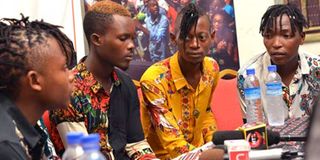Wamwiduka a boy band defying all the odds

Boy bands are not a very common thing in today’s music industry where individual stardom is all that many young artistes yawn for.
Over the weekend at the 16th edition of the Sauti za Busara music festival at the Old Fort in Stone Town, it indeed dawned on the thousands of revellers that it is an idea that is still worth pursuing.
Wamwiduka a boy band that was formed by young energetic men had come to remind the audience that authentic African music still has its place even at such times when it is all about the commercial gains.
Playing on the second day of the festival they blended guitar music with traditional rhythms and sounds in a fresh and exciting manner that got the audience on their feet.
Their songs such as ‘Kilingeni’ and ‘Ni Wewe’ were uplifting full of soul searching messages that resonated with both local and international audiences who sang along.
Speaking to The Beat after their performance Brown Isaya 22, writer, lead vocalist narrates the genesis of the quartet which can be traced in Ivumwe, Mwakibete in Mbeya.
He says, the band members come from musical families given the fact that most of their relatives were performers.
Brown says he was inspired by his father who was a performer and that is why he found it easy to team up with the other boys to form Wamwiduka Band.
The three band members are Adriano Wilson 23 (lead guitar/Banjo), Zakaria Michael 24 (Percs, vocals) and Peter Mashaka, 22, (bass/Babatoni).
Their humble beginnings have not deterred them from seeking to become the very best, and on this night they were surrounded with some of the cream of African music.
For them music was an escape from frustrations caused by being unemployed.
It was later a big surprise that they started to get recognition and were invited to many local celebrations.
This brought them the idea of starting to move around public places instead of waiting for invitations.
As the case might be with many in the creative arts, none of the Band members had any secondary education, the free time they had it was invested in practising music by singing, playing instruments and dancing.
In 2007 the Band got an opportunity to perform at the Karibu Music Festival in Bagamoyo. To them this was a unique opportunity that exposed them different genres of music as they rubbed shoulders with artistes from other Bands.
Currently the Band has moved to Dar es Salaam where it has set up its base with gigs coming from different sections of the city.
Kwame Mchauru is the band’s manager who met them some six months ago through a friend who owns Kuzi Live Ent label.
“I had no problem and I said yes because I had seen the boys through Karibu Music festival. I saw their performance and I knew some of their work but we never had a chance to meet and talk about their career path,” says Mchauru.
He says, the vibe at Sauti za Busara came from a workshop that was funded by the British Council which brought up together musicians from Kenya, the United States and Zawose Sisters group from Tanzania.
At the end of the workshop they produced work was showcased at theye Wikiendi Live festival as well as Busara Extra.
Busara Xtra activities is a platform that allows the Zanzibar local community to own the festival and show the islands hospitality to visitors. The activities are of cultural interest to Sauti za Busara audiences, outside of the main stage programme.
He says, being able to combine creativity from other groups challenged them and the results were as seen at the festival.
Through Sauti za Busara festival 2019 Wamwiduka have been able to showcase their work around the World as well as getting a platform, to get coverage and videos that will be used as documentation for their future use.
Networking and being able to see other International artists’ presentations themselves on stage as well as in normal life is another way of learning for them.
The origin of the word Wamwiduka is derived from Safwa ethnic community from Mbeya region, which means a Shopkeeper or shop-owner).
The band plays the babatone, a homemade instrument that is very popular in Mbeya as well as in neighbouring Malawi, and they also use the self-made four-string guitar, creating the traditional banjo sound.




